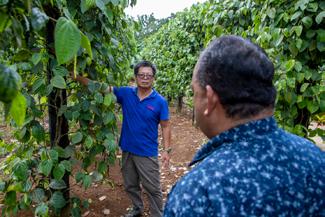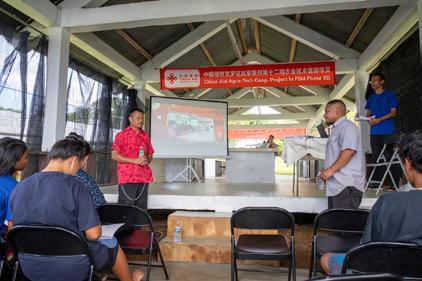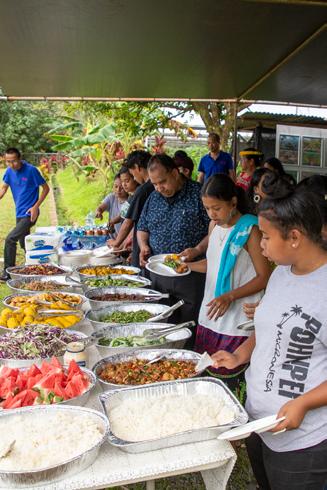
5 minute read
FSM China Pilot Farm kicks off the 12th phase of operations in Pohnpei
By Bill Jaynes The Kaselehlie Press
June 2, 2023
Advertisement
Madolenihmw—Staff members of the FSM Pilot Farm located in Madolenihmw today gave a tour of the farm, followed by a cooking demonstration to celebrate the official opening of the 12th phase of the farm program. The program, which is part of the China-Aid Agricultural Technical Cooperation Program, was initiated in 1998 and has since then provided training on planting and cultivation techniques, pig breeding and biogas, operations and the symbiosis of the two to thousands of local farmers throughout Pohnpei.

Invited visitors included students and teachers of Madolenihmw High School who have a small training plot within the farm, a representative of the Pohnpei’s Department of Resources and Development, and Senator Nelpert Perez, chairperson of the committee on land at the Pohnpei Legislature.

Senator Perez challenged the staff members of the farm to work on their transparency, particularly with the Pohnpei State Legislature. He said that he ventured to guess that since the farm was set up through the National Government and that most of the communication between the farm staff members was with the President’s or Governor’s offices, most of the Legislatures currently have no idea about the farm and what it does. That lack of understanding could hamper legislative support for the farm program at the State level at a time when that body is considering legislation to set aside several pieces of Pohnpei land in each municipality for agricultural purposes.
The materials provided by the farm’s staff members said that the implementation goals of the program are to:
· cultivate special agricultural products to assist FSM in preparation of the export of produce to neighboring countries and regions,
· To assist FSM in fostering a sustainable agricultural economy with diversified and localized food resources that ensure improved diet structure, and an ample supply of agricultural products on the market,
To expand the application of clean and renewable biogas that reduces the energy expenditure for local people and protect the environment in active response to the issue of global warming thus contributing to the poverty alleviation and improvement of people’s livelihoods.

So far, the Chinese experts at the farm have successfully introduced and cultivated sweet peppers, chilies, corns, cucumbers, beans, Shanghai greens, cabbages, eggplants, pumpkins, bitter gourds, leeks, watermelons, water spinach, wax gourds, musk melons, tomatoes, coriander, chives, okras, green beans, radishes, head cabbages, gingers, luffas, zucchini, lettuces, etc. Among them, cucumbers, eggplants, Chinese cabbages, head cabbages, corn, watermelons, musk melons, and okras are the most popular among local people, which are their key promotion varieties.
They say they have adopted such technical measures as increasing the application of organic manure (compost, biogas slurry), using greenhouses and drip irrigation, adopting measures such as crop rotation, soil improvement, plastic film mulching, physical control of diseases and pests, artificial pollination and seedling nursery cultivation. The farm not only does not sell the produce they harvest but are legally barred from doing so. They have transferred the produce they grow and harvest to the Agriculture Division, thereby meeting part of the demand of the local market and also providing fresh vegetable supplies for Chinese scientific research ships.

The materials say that through the use of learned techniques and technology, the farm has had a success rate of 80 percent of healthy piglets, and a total of 848 pigs have been transferred to the Agriculture Division of Pohnpei’s Department of R&D. Staff members also aid the 49 families who host biogas facilities that were provided through the program to ensure that the pigs providing the waste products for the biogas products remain healthy and also are able to successfully reproduce. They also perform on-site inspection services of the biogas demonstration sites, as well as assistance with maintenance on the digesters to ensure that they are operated safely. The staff says that the biogas generated by one biogas digester can save an equivalent of nearly $3000 in annual LP gas expenditures.
“It is the best way for FSM government to solve a series of difficult problems effectively in such pressing issues as reducing environmental pollution, comprehensive utilization of organic waste and replacement of high-cost energy by renewable clean energy. It is of great significance in protecting ecological environment and maintaining sustainable agricultural development,” the presentation materials said.
During the tour, staff members pointed out various advantages of agricultural procedures and benefits. At the first stop on the tour, the guide pointed out the use of ‘biogas slurry’, a by-product of biogas digesters, as fertilizer for the plants. He also pointed out the area where Madolenihmw High School students have been experimenting with cultivation methods of at least three varieties of plants, including corn. He pointed out one plant bed in particular that has no human consumption potential but is successfully used to supplement commercial pig feed for reduced cost in raising pigs.

After the tour and speeches were concluded, staff members gave a cooking demonstration using produce grown on the farm. Within a space of approximately 10 minutes, the cook produced three separate recipes, two of which were cooked in a wok pan over a stove fueled by biogas. After the samples were passed around for tasting, the staff treated the students to a lunch also, with the exception of rice and some beef dishes, consisting of foods produced at the farm.







